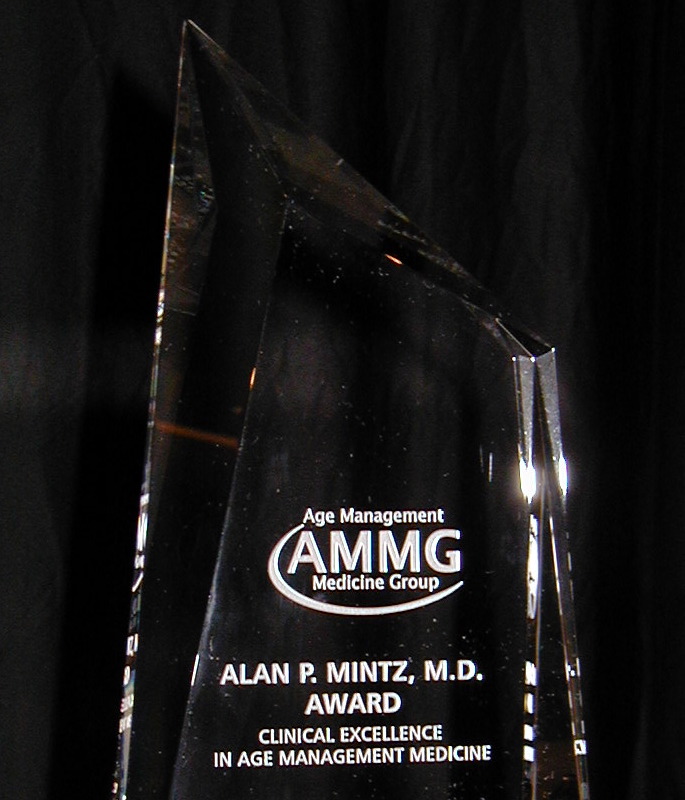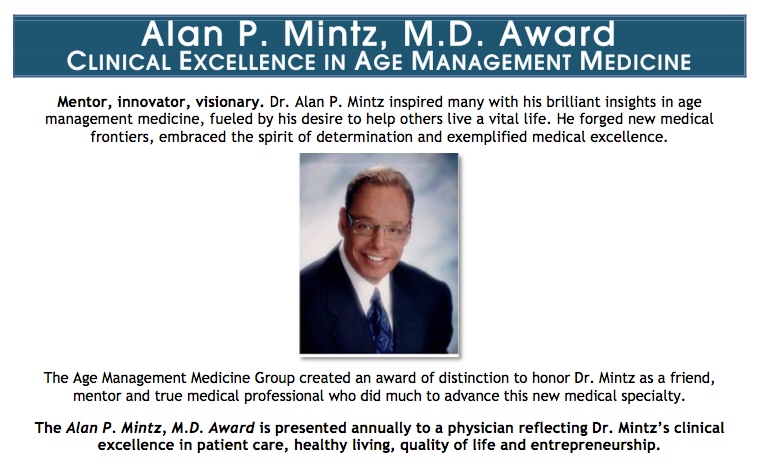
AMMG Presents 2013 Alan P. Mintz Award to Dr. Florence Comite
Jeff Morris
On the morning of Friday, November 1st at the 15th Clinical Applications for Age Management Medicine Conference in Las Vegas, NV, Florence Comite, M.D. was presented with the 2013 Alan P. Mintz Award for Clinical Excellence in Age Management Medicine.
 Florence Comite, M.D. is Courtesy Attending Physician at Yale-New Haven Hospital, New Haven, CT, and is in private practice at ComiteMD in New York, NY. A leader both in Women’s Health and the evolution of wellness-based health care and preventive medicine, she defined new approaches to optimize health for women at mid-life and beyond. Dr. Comite primarily directs her practice to Age Management Medicine, including bioidentical hormonal therapy, growth hormone, men’s and women’s health, andropause and menopause, sexual function and lifestyle issues. She is focused on the prevention of disorders related to aging such as osteoporosis, heart disease and cancer, and has pioneered an integrated approach to healthcare delivery with an emphasis on customized health strategies for women and men. Her clinical program is based upon an individualized, in-depth assessment and risk-benefit analysis that catalyzes conventional, complementary, and lifestyle choices to attain, sustain and maintain well-being. She incorporates a multidisciplinary team, trained to approach the clinician-patient relationship as a partnership.
Florence Comite, M.D. is Courtesy Attending Physician at Yale-New Haven Hospital, New Haven, CT, and is in private practice at ComiteMD in New York, NY. A leader both in Women’s Health and the evolution of wellness-based health care and preventive medicine, she defined new approaches to optimize health for women at mid-life and beyond. Dr. Comite primarily directs her practice to Age Management Medicine, including bioidentical hormonal therapy, growth hormone, men’s and women’s health, andropause and menopause, sexual function and lifestyle issues. She is focused on the prevention of disorders related to aging such as osteoporosis, heart disease and cancer, and has pioneered an integrated approach to healthcare delivery with an emphasis on customized health strategies for women and men. Her clinical program is based upon an individualized, in-depth assessment and risk-benefit analysis that catalyzes conventional, complementary, and lifestyle choices to attain, sustain and maintain well-being. She incorporates a multidisciplinary team, trained to approach the clinician-patient relationship as a partnership.
In 1976, Dr. Comite graduated from Yale University School of Medicine with awards for original research, and continued at Yale with a residency in Medicine. She then completed a fellowship in Reproductive Endocrinology (Medicine, Gynecology and Pediatrics) at the National Institute of Child Health and Human Development (NICHD). She remained at NIH as a Senior Clinical Associate until 1984 and joined the Yale faculty in 1985. She founded Women's Health at Yale in 1988 and was its director for 10 years, while serving as an Associate Professor in Endocrinology, Departments of Internal Medicine and Pediatrics, and in Reproductive Endocrinology, Department of Obstetrics and Gynecology. From 1994 to 1995, Dr. Comite was a Senior Clinical and Research Advisor to the NIH Offices of Alternative Medicine (OAM) and Research in Women’s Health (ORWH).
Dr. Comite has been a regular speaker at the Age Management Medicine Conferences since November 2007, when she single-handedly presented four back-to-back pre-conference sessions on Hormone Evaluation of the Aging Female. She joined the AMMG Conference Planning Committee in 2011.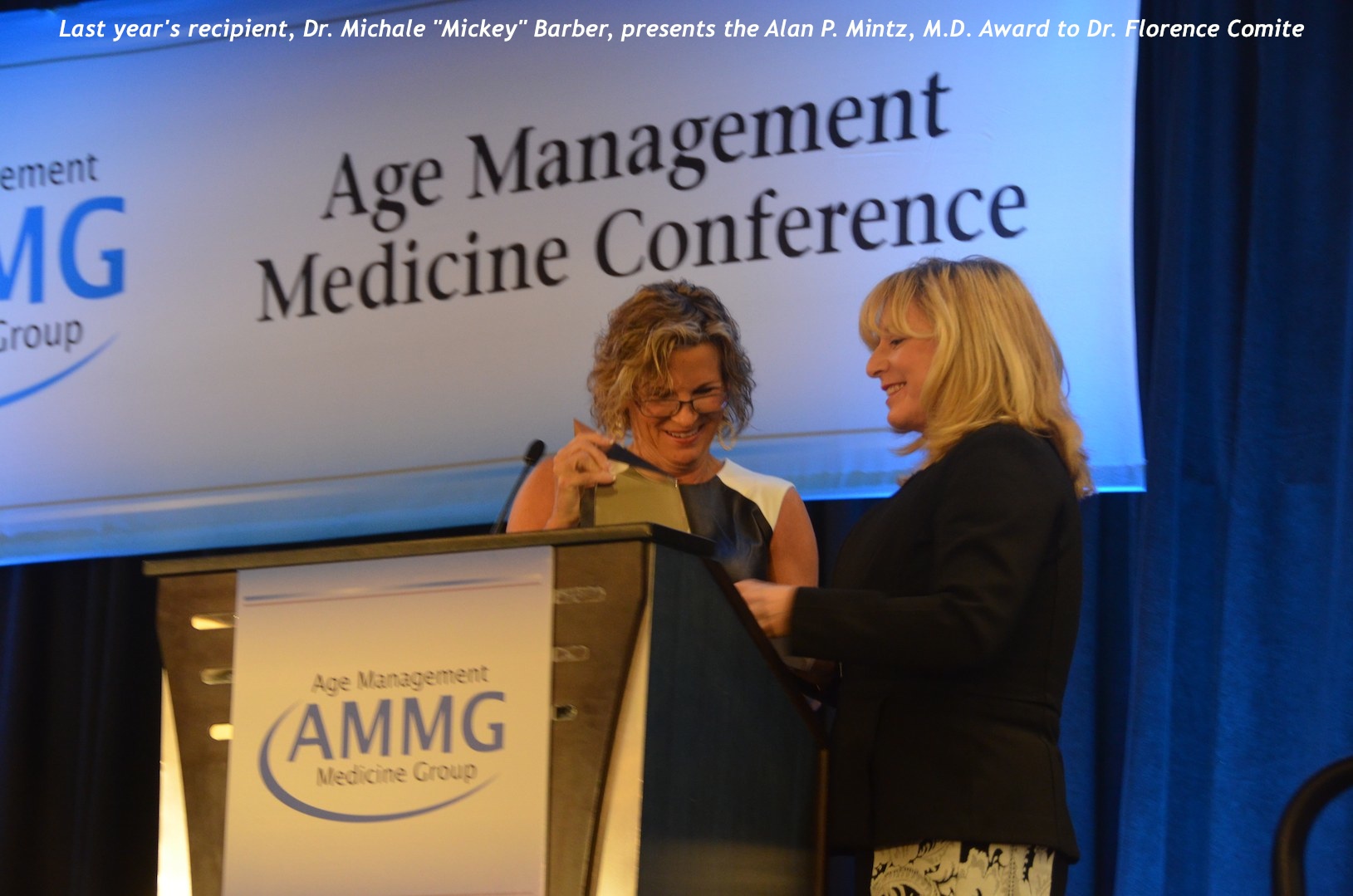
In 2006, Dr. Comite told us that the move from a focus on women’s health to a focus on individualized programs that optimize health for both sexes was a gradual one, but one that was triggered by her personal experience with the health rigors of aging parents and her boomer patients, who had questions about how to maintain their health, despite the aging process. Observing that American health care is built to manage symptomatic disease, Dr. Comite was determined to do what she could to re-focus health care on prevention. By identifying risk and pre-symptomatic disease in individuals, Dr. Comite’s approach allows for limiting the disorders of aging while proactively sustaining health.
“Prior to starting Women’s Health at Yale, which was the first such center in the country, I trained in endocrinology at the National Institutes of Health (NIH),” recalls Dr. Comite. “My concentration on prevention arose as a product of my training in endocrinology. At the NIH, I focused my research on premature or precocious puberty in children, using agonists of Gonadotropin Hormone Releasing Hormone; these medications became the standard for treating children who were pubescent at an early age. This research ultimately led to research in perimenopause in women at Yale. Forty-year-old women undergoing perimenopause had wildly fluctuating hormones and were experiencing bodily changes that were overwhelming to some, not unlike puberty. Ultimately, women came to see me because their bodies were changing—for instance, they were putting on weight around their middle.”
Fortunately, Dr. Comite had completed a fellowship in Reproductive Endocrinology (Medicine, Gynecology, Andrology and Pediatrics) at the National Institute of Child Health and Human Development (NICHD). She remained at NIH as a Senior Clinical Associate until 1984 and joined the Yale faculty in 1985. Her background in endocrinology led her to look at her perimenopausal patients somewhat differently. “At NIH I had a window into hormonal development and change. It was very fortuitous due to my background in endocrinology, I appreciated changes that evolved with the aging process. I thought of health and aging as a decade issue—what was happening in a woman’s body as she hit the 30s, for example, or into the 40s— fertility diminishes as a woman’s bones are beginning to thin, they’re developing facial hair, suffering PMS and perimenopause (a stage that no one even recognized existed). The upside of being a woman was that every month you were in touch with your body; women would tell me what was happening with their cycle. In contrast, men have fewer tangible signs to appreciate as they age. Their symptoms are more subtle and gradual, without a specific indication of how their bodies are evolving. So while the aging process in both men and women begins in the late 30s or early 40s, women tend to be more in touch with the transformation earlier than men. However, the emergence of Viagra, Levitra and Cialis, and their widespread use, has helped men center on their bodies and the events associated with aging.”
“In 1986, my initial focus on women’s health was precipitated by the baby boomer women, turning 40 every 7 seconds. These women—the sandwich generation—were demanding information on maintaining their health; they experienced their parents living longer lives, but without quality of life due to age related diseases. I was frustrated because I felt medicine wasn’t dealing with patients effectively on a day to day basis,” she says. “I turned my patients into my partners, asking them to collect detailed information on family and medical history, as well as their nutrition habits and lifestyle. I created a model that would basically detect what I call pre-symptomatic disease. Why wait until a disease has presented itself? Most doctors are so focused upon taking care of disease because that’s what we're trained to do. But what isn’t taught in medicine is an approach that emphasizes prevention; and looks at the pre-disease state, risk factors due to lifestyle or family history and substantiated by test results.”
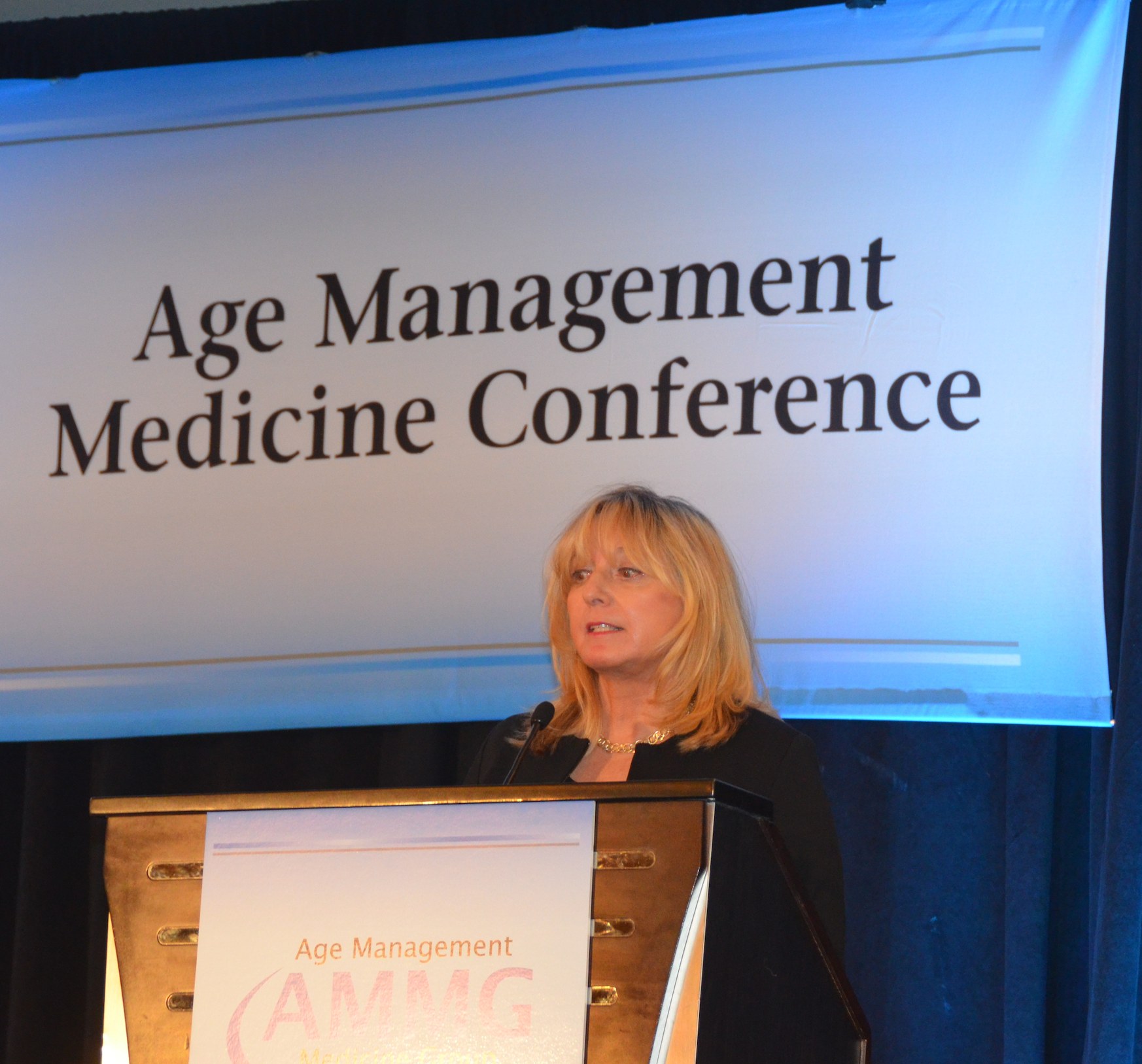 In 1997, when Women’s Health at Yale was in its infancy, Dr. Comite said the program had three missions: to provide comprehensive clinical care for women; to educate the patients and the professionals who work with them; and to compile research data on health issues that specifically affect women. Notes Dr. Comite, “When I first started the program at Yale, women were noticing these changes in their bodies even though they did everything ‘right’. By looking at their family history in conjunction with their lab reports I could predict where they might be at risk in the future. Their patterns were changing, though it wasn’t something they felt symptomatic about at that point. But it was clear they had to make lifestyle, exercise, and nutritional choices.” And she described how Women’s Health was launched: She had to present the idea to about 15 department heads, all of whom were male. According to Dr. Comite, they weren't quite persuaded, but when they mentioned the idea to their wives, "the women all said, 'What a great idea! Why isn't there a place where I can go to get all my medical needs taken care of? Why do I have to traipse around for various evaluations?'" The upshot was that their husbands all agreed to support the program.
In 1997, when Women’s Health at Yale was in its infancy, Dr. Comite said the program had three missions: to provide comprehensive clinical care for women; to educate the patients and the professionals who work with them; and to compile research data on health issues that specifically affect women. Notes Dr. Comite, “When I first started the program at Yale, women were noticing these changes in their bodies even though they did everything ‘right’. By looking at their family history in conjunction with their lab reports I could predict where they might be at risk in the future. Their patterns were changing, though it wasn’t something they felt symptomatic about at that point. But it was clear they had to make lifestyle, exercise, and nutritional choices.” And she described how Women’s Health was launched: She had to present the idea to about 15 department heads, all of whom were male. According to Dr. Comite, they weren't quite persuaded, but when they mentioned the idea to their wives, "the women all said, 'What a great idea! Why isn't there a place where I can go to get all my medical needs taken care of? Why do I have to traipse around for various evaluations?'" The upshot was that their husbands all agreed to support the program.
Dr. Comite said the impetus for an integrated health program came from the realization that women were neglecting themselves. "Women spend two out of every three medical dollars for themselves and their families, yet they put themselves last when it comes to their own personal health care. Most women, including myself, have so many demands on them that they are too busy and too tired to coordinate all the pieces of their own care." Dr. Comite later oversaw the evolution of this whole-being integrated concept to its next level. “I realized that a lack of information was affecting me personally,” she recalled. “I had one of the best gynecologists in the country, and she never asked me if there were any recent deaths in my family. She never asked if there was a recent family history of osteoporosis or heart disease.” Dr. Comite came up with an approach called the Health Portfolio in order to identify and then minimize health liabilities while accentuating a patient’s attributes. It was based on the financial portfolios so many people had in the affluent Greenwich, CT area. “People were prepared to collect all their financial data and then consult with an advisor to protect their financial future—but most had never collected information on their health. I began to frame it as the ability to create an analogous vehicle, the Health Portfolio.”
In 2005, Dr. Comite introduced her age management and endocrinology program in New York, offering comprehensive evaluations for men and women interested in preventing disease and staying healthy. Her practice centers on the needs of men and women motivated to sustain their health by concentrating on lifestyle approaches such as nutrition, exercise, as well as hormonal therapy to prevent heart disease, osteoporosis, diabetes, and cancer. Dr. Comite primarily directs her practice to the management of andropause in men, and perimenopause and menopause in women—natural events that can cause challenges in sexual function, libido, energy, weight maintenance, muscle mass, bone loss, hormonal and cholesterol alteration. Individuals managed by Dr. Comite have experience marked improvement in libido, sexual function, decreased fat, increased muscle strength, reduced weight, improved energy levels, blood pressure, and cholesterol profiles.
Florence Comite, an innovator and leader in her field, is clearly a worthy recipient of the Alan P. Mintz, M.D. Award.
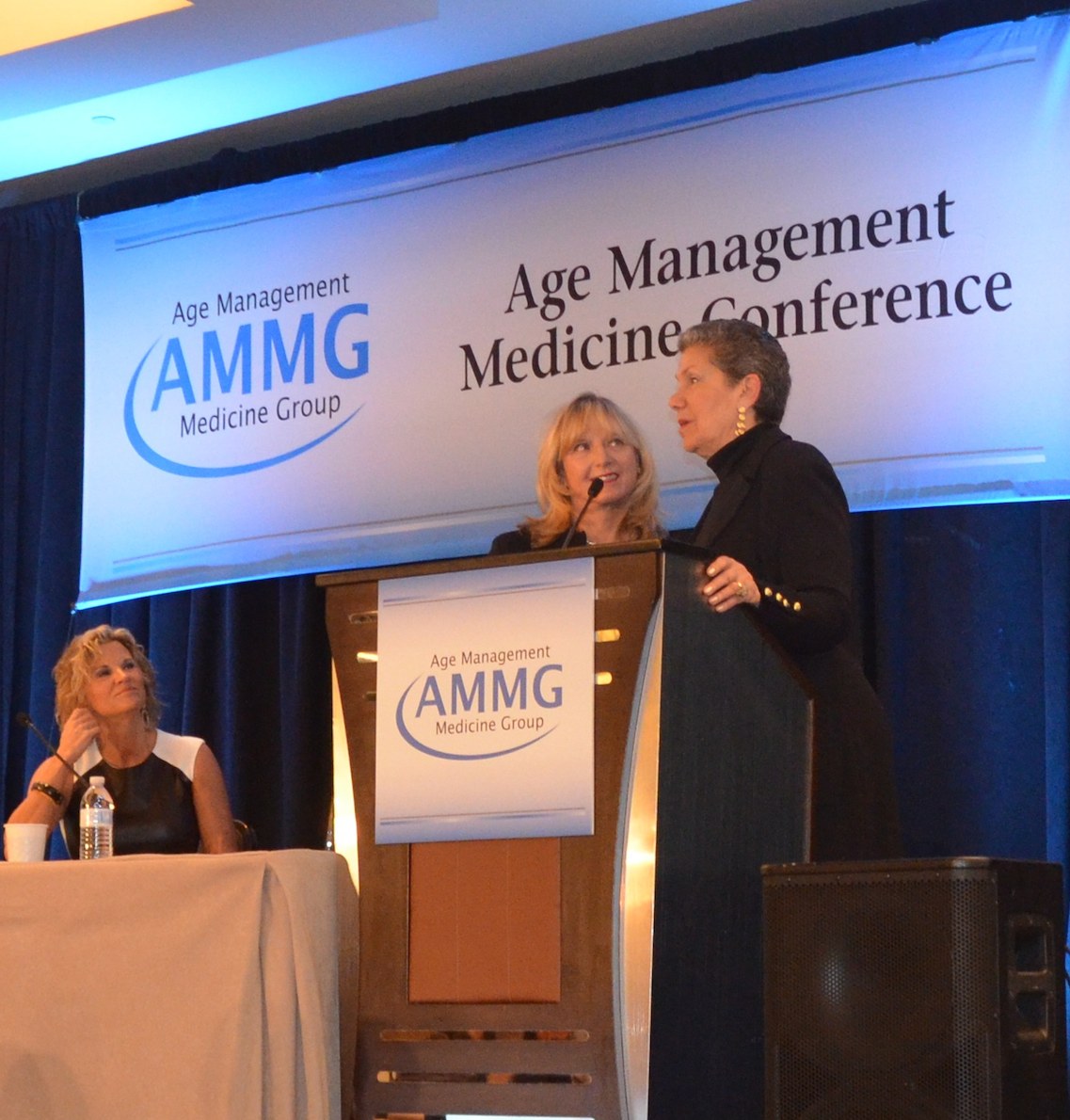
Left to right: Dr. Mickey Barber, Dr. Florence Comite, and Rabbi Yocheved Mintz.
